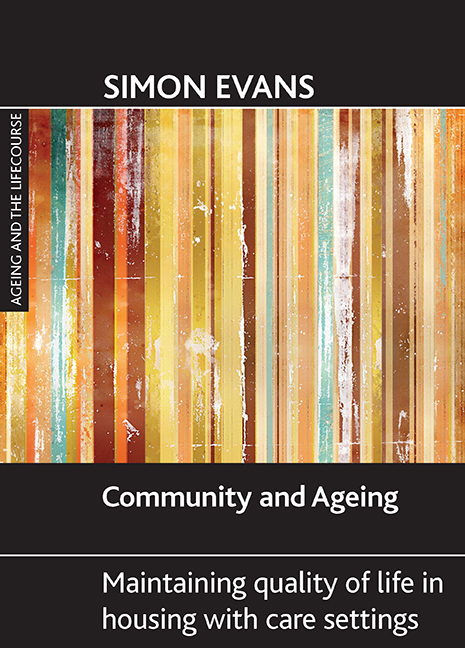Book contents
- Frontmatter
- Contents
- List of tables, boxes and photos
- Acknowledgements
- Foreword
- one Introduction
- two What is community?
- three Community and ageing
- four Housing with care communities in the UK
- five An international perspective on retirement villages
- six Promoting a sense of community in housing with care settings
- seven Diversity, community and social interaction
- eight Changing communities and older people
- nine Conclusion
- Appendix
- References
- Index
eight - Changing communities and older people
Published online by Cambridge University Press: 05 July 2022
- Frontmatter
- Contents
- List of tables, boxes and photos
- Acknowledgements
- Foreword
- one Introduction
- two What is community?
- three Community and ageing
- four Housing with care communities in the UK
- five An international perspective on retirement villages
- six Promoting a sense of community in housing with care settings
- seven Diversity, community and social interaction
- eight Changing communities and older people
- nine Conclusion
- Appendix
- References
- Index
Summary
Introduction
The social and economic structure of local communities in Britain has changed considerably in recent decades, particularly in terms of the closure of services and facilities that have traditionally been at their centre, such as post offices, banks and local shops. These changes affect us all, but they are particularly significant for older people, many of whom spend more time in their neighbourhoods as they grow older and often find themselves facing reduced mobility, poorer health, decreasing incomes and limited opportunities for social interaction. This chapter considers how communities have changed for older people and how they might continue to do so during the coming decades. This includes a look at a range of factors that affect community engagement, including demographic changes, the delivery of low-level services, increasing use of technology and telecare, transport infrastructure, the supply and design of housing, and older people's needs and aspirations. Finally, the future of housing with care settings as communities is explored.
Older people, social changes and community engagement
While it is important not to treat older people as a homogeneous group, there is a widespread feeling that the so-called baby boomers are different from previous generations. In particular, they are seen as more comfortable with asserting their rights and also have more spending power. The perception of older people as consumers with, on average, greater than ever amounts of money to spend has been well documented (Gilleard and Higgs, 2000). However, it is important to bear in mind that many pensioners are in poverty and, despite ever-increasing consumer choices, the best prices are often only available via the internet or in out-of-town malls. In either case, many older people lack the necessary transport or internet facilities to access them.
There is considerable evidence, much of it reviewed in Chapter Six of this book, to suggest that a sense of community and independence both factor strongly in decisions about where to live in retirement. I have also suggested that the local area in which older people live is of particular importance. As a result, changes in local communities and neighbourhoods often have more impact on older people than they do on many other residents.
- Type
- Chapter
- Information
- Community and AgeingMaintaining Quality of Life in Housing with Care Settings, pp. 109 - 124Publisher: Bristol University PressPrint publication year: 2009



